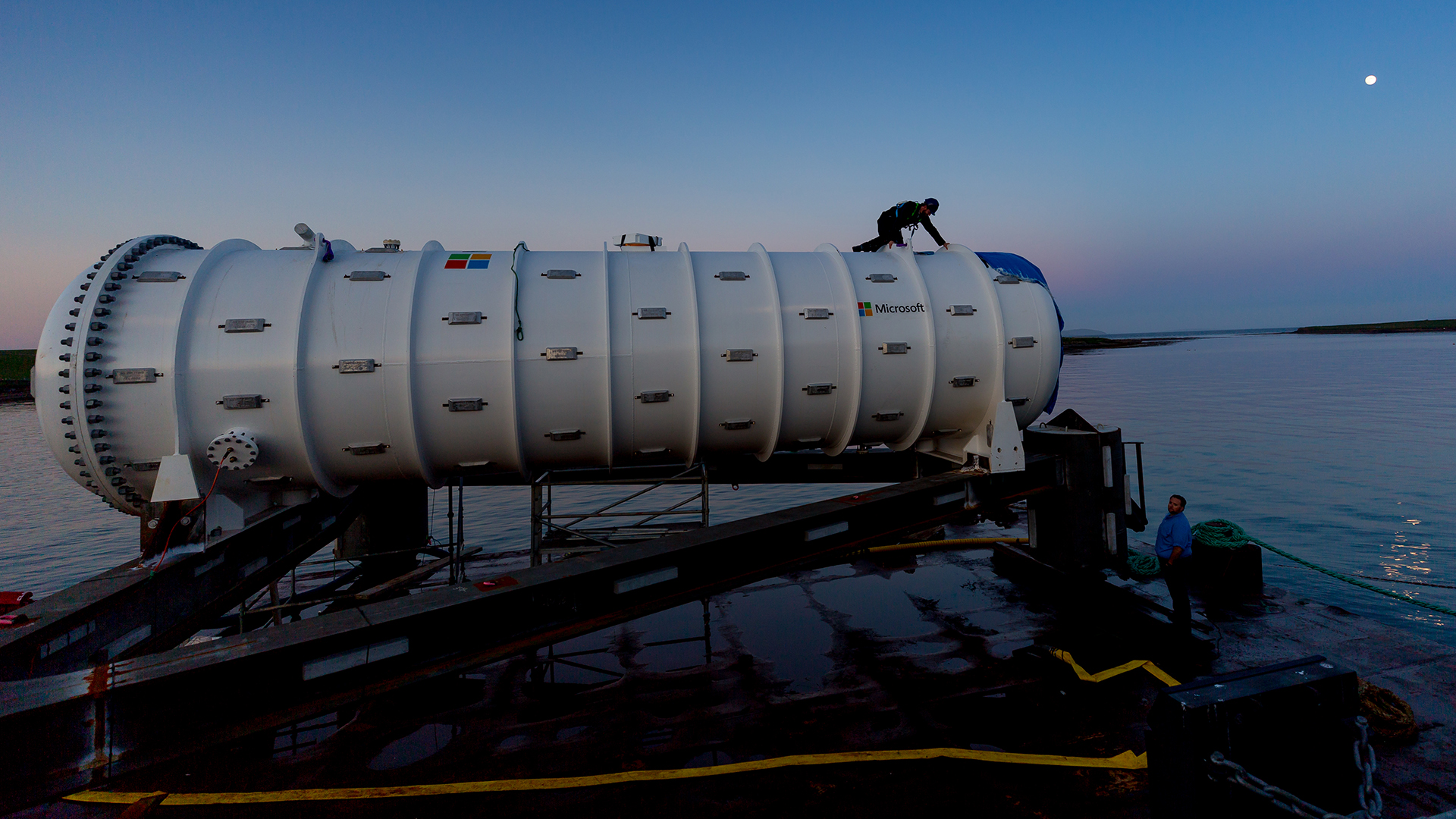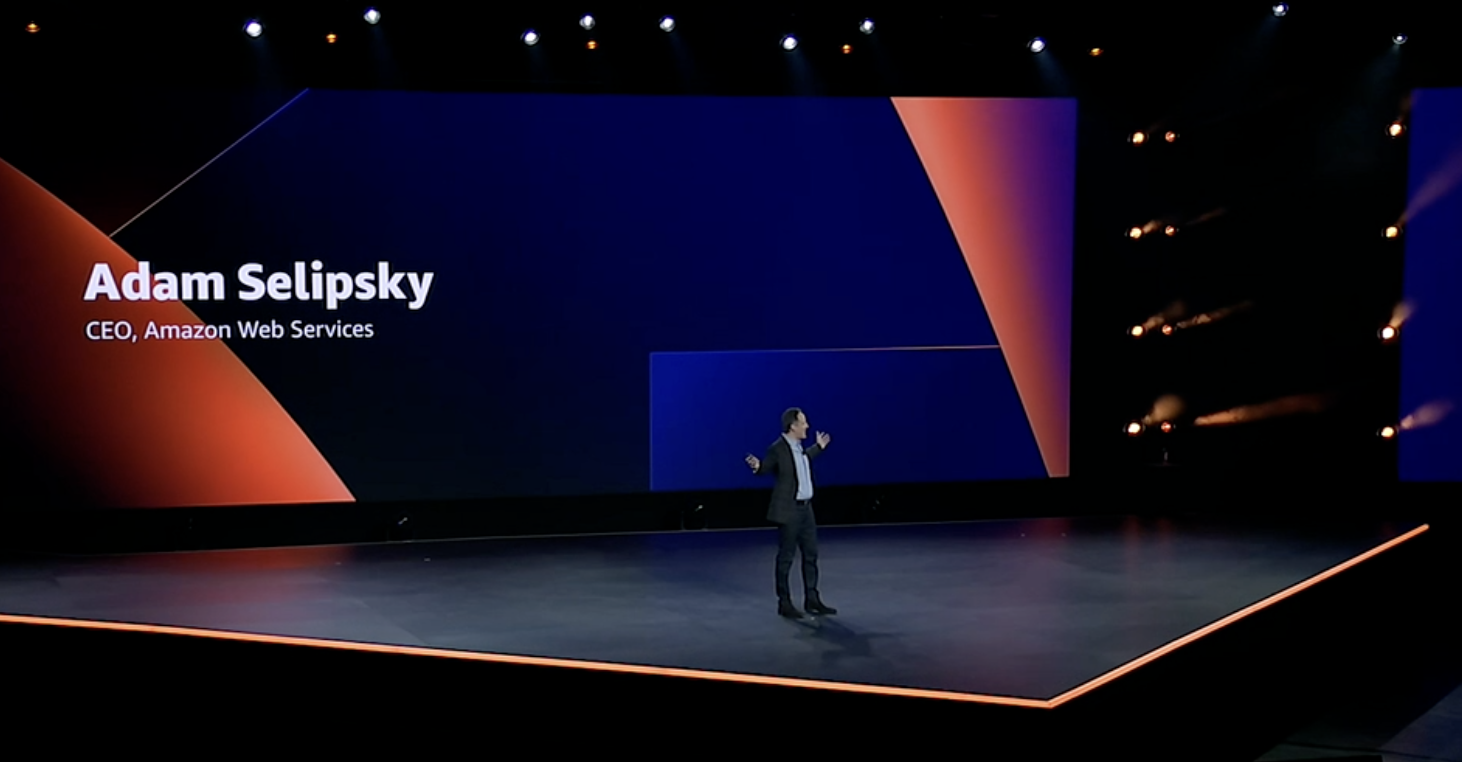Microsoft drops a clean energy data centre into the North Sea
Redmond hopes the underwater cloud storage facility could mean faster data transfers


Microsoft has leveraged the technologies of submarines and renewable energy to plunge a 40ft-long datacentre into the sea near Scotland's Orkney Islands.
The experimental shipping container-sized prototype, called "Project Natick", is currently in operation on the seafloor next to the European Marine Energy Centre, just off the Northern Isles.
This Davy Jones' datacentre is the result of a year's worth of research into environmentally sustainable data storage technology that the software giant hopes could one day be ordered to size, rapidly deployed and left to operate at the bottom of the sea for years.
"That is kind of a crazy set of demands to make," admitted Peter Lee, corporate vice president of Microsoft AI and research, who leads the NEXT group, a Microsoft research program for pioneering new technologies, which is overseeing the experiment. "Natick is trying to get there."
Microsoft is pursuing what it calls a "relevant moonshot"; projects the company believes have the potential to transform the core of its business and the wider cloud computing industry.
The cylindrical storage container is loaded with 12 racks containing a total of 864 servers and has a self-sustaining cooling system that Microsoft has adapted from the heat-exchange process used in submarines. It works by piping seawater through radiators on the back of each rack to cool them down, before the now-heated water is expelled back into the ocean where it mixes with the surrounding currents.
An underwater cable from the European Marine Energy Centre on the Orkney Islands will power the datacentre. The energy centre is a test site for experimental tidal turbines and wave energy converters that generate electricity from the movement of seawater.
Get the ITPro daily newsletter
Sign up today and you will receive a free copy of our Future Focus 2025 report - the leading guidance on AI, cybersecurity and other IT challenges as per 700+ senior executives
By plunging datacentres in bodies of water near coastal cities, data would have short distances to travel to reach coastal communities. It's estimated that half of the world's population live within 120 miles of a coast, so off-shore datacentres could lead to faster web browsing, streaming and a boost for AI-driven technologies.
"For true delivery of AI, we are really cloud-dependent today," added Lee. "If we can be within one internet hop of everyone, then it not only benefits our products but also the products our customers serve."
Microsoft hopes to leave the datacentre in place for five years without having to intervene - once submerged, it's impossible for engineers to gain access to the facility. It will monitor its performance for 12 months to see if such an idea is practical.
"Like any new car, we kick the tires and run the engine in different speeds to make sure everything works well," said Spencer Flowers, who is a senior member of technical staff for Microsoft's special projects.
"Then, once we are completely ready to go, we will grab one or two of our clients and hand them over the keys and let them start deploying jobs on to our system."
All pictures: Microsoft
Main image: Project Natick team (l-r): Mike Shepperd, Samuel Ogden, Spencer Fowers, Eric Peterson, Ben Cutler
Bobby Hellard is ITPro's Reviews Editor and has worked on CloudPro and ChannelPro since 2018. In his time at ITPro, Bobby has covered stories for all the major technology companies, such as Apple, Microsoft, Amazon and Facebook, and regularly attends industry-leading events such as AWS Re:Invent and Google Cloud Next.
Bobby mainly covers hardware reviews, but you will also recognize him as the face of many of our video reviews of laptops and smartphones.
-
 Bigger salaries, more burnout: Is the CISO role in crisis?
Bigger salaries, more burnout: Is the CISO role in crisis?In-depth CISOs are more stressed than ever before – but why is this and what can be done?
By Kate O'Flaherty Published
-
 Cheap cyber crime kits can be bought on the dark web for less than $25
Cheap cyber crime kits can be bought on the dark web for less than $25News Research from NordVPN shows phishing kits are now widely available on the dark web and via messaging apps like Telegram, and are often selling for less than $25.
By Emma Woollacott Published
-
 AWS, Microsoft, and Google see massive cloud opportunities in Japan - here’s why
AWS, Microsoft, and Google see massive cloud opportunities in Japan - here’s whyAnalysis AWS’ bid to expand infrastructure in Japan will see it it invest over $15 billion, but it’s not the only hyperscaler that has its eye on big gains in the country
By Solomon Klappholz Published
-
 Hyperscaler earnings 'highlight new era of maturity' in global cloud market
Hyperscaler earnings 'highlight new era of maturity' in global cloud marketNews Sluggish earnings for Azure, Google Cloud, and AWS could point to a more moderate cloud market in the year ahead
By Ross Kelly Published
-
 Nokia to offer data centre switches to boost Azure bandwidth
Nokia to offer data centre switches to boost Azure bandwidthNews The announcement is part of an ongoing collaboration to develop the 'SONiC' networking initiative
By Bobby Hellard Published
-
 Microsoft wins contract to build Singapore's first sovereign cloud
Microsoft wins contract to build Singapore's first sovereign cloudNews It hopes the deal will will help keep the city-state “the safest place on the planet”
By Zach Marzouk Published
-
 AWS shakes off outages with 40% surge in revenue
AWS shakes off outages with 40% surge in revenueNews However, analysts warn the cloud giant should be wary of the 'impressive growth' of Microsoft and Google
By Bobby Hellard Published
-
 IAR Systems and Secure Thingz partner to streamline Azure IoT migration
IAR Systems and Secure Thingz partner to streamline Azure IoT migrationNews Joint solution expedites device development and deployment for Azure IoT and RTOS platforms
By Praharsha Anand Published
-
 Microsoft bolsters Azure with AT&T 5G deal and security collaboration
Microsoft bolsters Azure with AT&T 5G deal and security collaborationNews The firm acquire’s AT&T’s Network Cloud platform while integrating MITRE's ATT&CK framework
By Keumars Afifi-Sabet Published
-
 Microsoft reveals plans for massive cloud expansion in China
Microsoft reveals plans for massive cloud expansion in ChinaNews The company is planning four new data centres in China to meet surging demand for its services
By Zach Marzouk Published